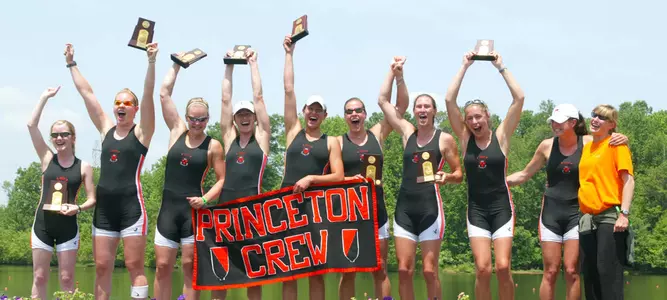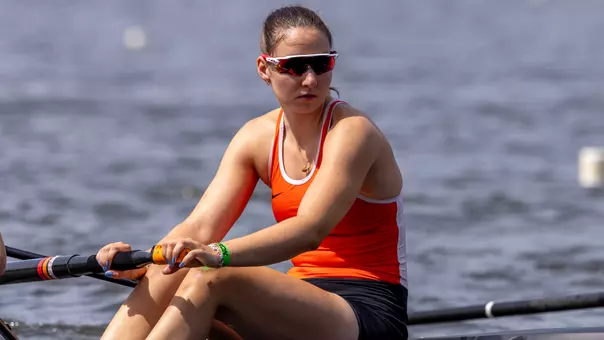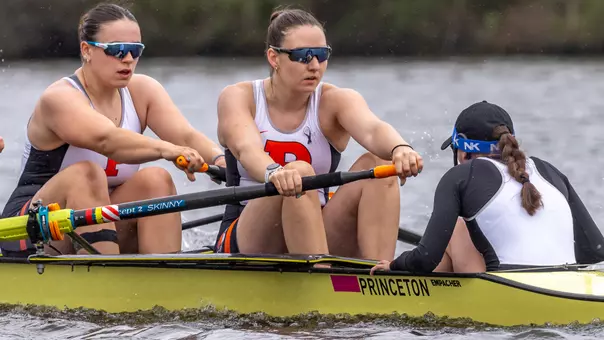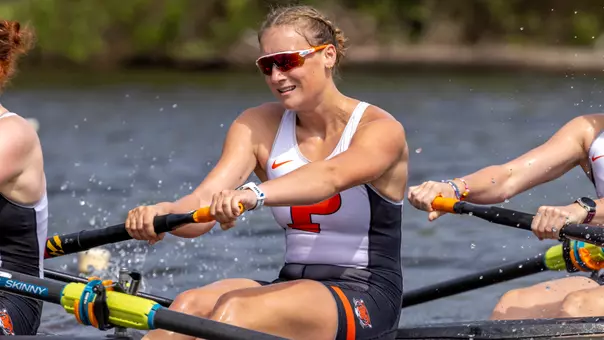Princeton University Athletics

Talent, Drive & Memory Sent The '06 Tigers To NCAA Gold, Rowing Immortality
May 25, 2016 | Women's Rowing - Open
The Ivy League champion Princeton open women will compete for the 2016 NCAA Championship this weekend. GoPrincetonTigers.com will have a full preview later Wednesday; before that, we take a look back on a boat that set the standard in the sport one decade earlier.
Nine women — each loaded with talent, personality and respect for their teammates — came together a decade ago to create the best Princeton team of the 21st century, and the best boat in the history of women's collegiate rowing.OK, so neither of those can be absolutely proven (though there are numbers to back them up). But nobody dominated one season like that one Princeton boat, the one with the walk-on captain, the four future Olympians, and the head coach who furiously jumped into the lake after an underwhelming practice — despite being several months pregnant.
Princeton dominated 2006 in a way that looked too easy to believe.
And therein lies the story of why this group was so special. There was nothing easy about this journey, because they found the worthiest, toughest competitor to drive them to immortality.
They battled themselves.
From her seat in the Princeton bow, Kate Bertko '06 was the last to see California during those fateful final 500 meters of the 2005 NCAA championship final. It had been a tough enough year already — injuries limited her until the Eastern Sprints final, which had a similarly heartbreaking finish — but this loss REALLY stung.
How much? Kristin Haraldsdottir '08 was only a freshman at the time; she would have plenty of big races to come. Still, she said that feeling lingered for her entire rowing career.
Bertko took it personally, though.
“It was a hard race, a very informative race,” she said of that 2005 final, when California rallied late to win gold by about two seconds. “I wasn't strong enough, fit enough to stop that from happening. I decided that I would never let that happen again. When we raced we would never put ourselves in a place that we could get passed.”
That race took place across the country, some 364 days before the 2006 final. It may as well have been the starting line, though.
Princeton's journey to gold, to becoming the greatest boat in collegiate history, began then and there.

Competition drove this Princeton boat, but it wasn't the standard Saturday morning competition you would expect.
Princeton went 14-0 that season, and its closest margin during the regular season was 9.1 seconds in an Eisenberg Cup win over Yale. This boat was loaded, and everybody knew it — including themselves.
The problem was that there were only eight seats in a boat destined for greatness.
“The way the system is, everybody earns their seat,” said Bertko, a four-year NCAA starter and one of five seniors in that varsity boat. “I had to earn my seat. Age isn't significant. That's the beautiful thing about rowing. It comes down to boat speed.”
The eight that earned those seats — Caroline Lind '06, Haraldsdottir, Jackie Zider '06, Devan Darby '06, Andreanne Morin '06, Caroline Kruse '07, Gevvie Stone '07, and Bertko, along with coxswain Lizzie Agnew '08 — probably weren't the only eight that could have won an NCAA title. It was a loaded squad with several rowers who simply missed out on that gold due to the basic numbers game — the rowers outnumbered the seats.
It surely caused uncomfortable moments. It definitely created upset feelings.
But it did not destroy the team.
“I think they policed themselves to some extent,” said Lori Dauphiny, who would be named National Head Coach of the Year in 2006. “There was maturity on that boat. There were proven athletes in there who went on after that race who did something fantastic things. There were challenges, there was friction at times, but they managed it.”
Part of the way they managed it was by leaving the competition on the erg, and on the water. Part of it was that they were so driven to succeed that they knew they needed each other.
“The varsity team that year was stacked with competitors,” Darby said. “Competition and doing well in competition is what fueled us and what built cohesion. There was a feeling of mutual respect. There is also a humility that rowing builds. You could have the world's fastest erg time, but on race day there are no superstars — you win or lose as a team. This is perhaps why some call rowing the 'ultimate team sport'.”
And they found the ultimate team captain.
Lind won back-to-back gold medals in the USA W8+ during the 2008 and 2012 Olympics. Morin made the 2004 and 2008 Canadian W8+, and then returned for a third time in 2012, where she earned a silver medal. Stone finished seventh in the single sculls in 2012, and she already earned her spot for the 2016 Olympics, where she is considered a strong medal contender. Bertko, who has had plenty of international success, will make her Olympic debut in the lightweight double this summer.
Eight Olympic experiences — nine if Lind returns this summer — in one collegiate boat. It's an absurd total. Yet the team voted Darby, the only walk-on in the boat, to captain a team that set the highest possible standard for itself.
And it was the perfect choice.
“Devan was unflappable,” Haraldsdottir said. “Nothing rattled her. She was an incredible student, and such a kind person. That's kind of an unusual treat. She wouldn't let losses, seat races, or erg scores get to her. In that boat, the buildup to selection, it was extremely emotional. It probably took me 10 years to get over it. Everyone knew it was a great boat, and what an honor it was to be part of it. We needed somebody like Devan to balance it.”
Currently a pediatrician in Boston, Darby was a successful athlete at Princess Anne High School in Virginia. She competed in swimming, basketball, cross country and soccer in high school, but she followed through on a previous desire to row and found her way to the boathouse.
Three dedicated years of improvement later, she was the chosen leader.
“I was definitely surprised,” Darby admits. “So many of my teammates had more experience in rowing and had been much more successful in the sport than I had. It just made me feel all the more honored by their decision.”
“Devon is the total package,” Bertko said of the woman who has volunteered both India and Africa, and who would win Princeton's Art Lane '34 Award for selfless contribution to sport and society. “She was a beautiful rower, a wonderful human being. She is a truly special person. She is a leader. There were a lot of personalities, and she was the best person for the job.”
Of course, she wasn't the only leader. It never hurts to have one of the best leaders in all of rowing on your side.
When Princeton begins its NCAA Championship hunt this weekend in Sacramento, Dauphiny will be 10 wins short of 200, and a winning percentage ridiculously close to .900. Her teams have won seven Ivy League championships, including four of the last six; her latest title came at the expense of the top-ranked boat in the country.
Dauphiny can coach with anybody. It isn't up for debate now, and it really wasn't back then either. Still, being six months pregnant and in charge of a boat that was deciding races by the 500-meter mark, you would have thought she could ease up on the reins that season.
Mention that theory to her rowers, and be prepared for a laugh. In Dauphiny's own words, “easing up just isn't part of my personality.”
In retrospect, her rowers wouldn't have it any other way.
“She never laid off,” said Haraldsdottir, who would later coach on Dauphiny's staff. “She always made it clear that if we rowed at the best, we'd be the best. I don't think I respect anybody more than her. She's tough, but she instills a confidence in yourself that is crazy. If you look at what we have all accomplished since then, it is a direct reflection on her.”
She never let Princeton settle, and she never took anything for granted. Her rowers were the same for the most part, though Bertko remembers a rare moment during the fall of her senior year — maybe after a brilliant Head of the Charles, when only the US National Team topped them — when even she started to feel like it was going to go their way.
“I said, 'Lori, we're going to do it this year',” Bertko said. “She was so mad at me for saying that. It was ours for the taking, but we had to take it. Nothing was going to be given to us.
“Lori coaches every stroke as if that stroke will win the NCAA Championship. None of us knew we were going to get that result. We were all good rowers — Caroline was a standout — but Lori took a bunch of nerdy Ivy League kids and made us monsters.”
Dauphiny pushed as hard as usual, but she also knew that this group was self-motivated and would hold themselves accountable. Nobody was going to ease up when their teammates — their friends — refused to do the same.
They were going hard, they were going fast, and they were going to Mercer Lake with only one goal in mind.

California remained the big mystery at NCAAs, mainly because there was so little crossover between East and West Coast rowing that season, but also because there were bad memories from the last time Cal and Princeton met at NCAAs.
Mercer Lake, a mere 15 minutes from the University, was the site for the final weekend for this magical boat. Between the weight of expectations and the level of competition, Dauphiny sensed a bit of tension over the first two days.
Day three, not so much.
“They were ready,” Dauphiny said. “They were down to business.”
The stakes were different. The crowd was different. The opponents were different.
But when it started, the race was the same as all the others.
“I enjoyed the whole race,” Darby said. “I remember jumping out to a lead at the start, then building on it. That was such an awesome feeling, to be rowing with such amazing, strong teammates and seeing all of the hours of training culminate on that day. In the last 500 meters when we had a solid lead, I remember thinking, 'Don't catch a crab—we're almost there!' I really enjoyed the day after the pain of the 2000 meters subsided.”
Princeton, coming from Lane 4, built a substantial lead 500 meters in and won in 6:36.851, while California (Lane 3) finished second in 6:43.260. The 6.7-second margin of victory for Princeton is the largest in any NCAA V8 final — by a lot. Go through 20 years of results, and you'll find a significant win is around 3-4 seconds. Outside of 2006, no boat won by more than 4.5 seconds — or more than two seconds fewer than the distance between Princeton and, well, anybody else.
Memories of last year's rally never let Princeton relax, even if California never factored into the gold medal hunt after the opening strokes.
“It was probably the most painful race I ever rowed, because I never looked around,” Haraldsdottir said. “We were sticking to the race plan no matter what.”
That was true of the race, and it was true of the season.
The plan was to challenge themselves every day, because nobody else could push them quite as hard, and get better from it.
It wasn't as easy as it looked. If you know the sport of rowing, nothing about it is easy. You work countless hours on ergs, on cold waters in adverse conditions, for less than an hour of competition time each year.
This wasn't about being easy. They could have pushed less, relaxed more, and you know what?
They still might have won. They were that good.
But champions are crowned every year. That wasn't what this boat was about.
They wanted to be the best of themselves and see what happened. They did so.
They were the best of themselves.
And they were the best of everybody else.
Ever.







